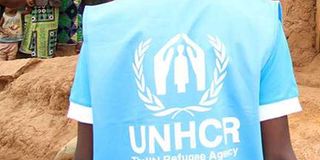Kenya put to task over missing Oromo leader Dabassa Guyo Saffaro

A picture of a UNHCR staff. The African Commission on Human and People’s Rights is seeking information from the Kenyan government on the disappearance of Oromo leader Dabassa Guyo Saffaro, who was under UNHCR protection. AFP FILE PHOTO | DENYSE UWERA
What you need to know:
- His family has been asking the UN refugee agency to help find him.
- Kenya has not ratified the Kampala Convention on Internally Displaced Persons, which provides displaced people with legal protection.
BANJUL
Africa’s top human rights body on Monday put Kenya to task over the disappearance of Oromo community leader Dabassa Guyo Saffaro.
The African Commission on Human and People’s Rights (ACHPR) also questioned what the government had done over the assassination of lawyer Peter Wanyama Wanyonyi.
Mr Saffaro, according to ACHPR Commissioner Maya Sahli Fadel, has been missing since September 27, with his family claiming the government may know where he is.
She said the Ethiopian refugee, who moved to Kenya in the early 1970s to flee political persecution, lived in Mlolongo, Machakos County, with some members of his family.
“It is alleged that the government had on several occasions accused him of being a leader of an Oromo community that practiced terror,” she said.
Mr Saffaro lived under the protection of the United Nations High Commissioner for Refugees (UNHCR) and was in the process of renewing his expired Kenyan identity card and travel documents when he disappeared. His family has been asking the UN refugee agency to help find him.
Ms Fadel asked the Kenyan delegation attending the 57th session of the ACHPR in Banjul, Gambia, to also explain the assassination of Mr Wanyonyi and what the government had done so far to bring his killers to book.
'PREMEDITATED' MURDER
Mr Wanyonyi was shot dead on September 17, 2013 as he returned home from a meeting in Bungoma Town.
The gunmen escaped without taking anything from him and the police stated that his murder could have been premeditated.
Ms Fadel questioned the disappearance and assassination of many other people and asked what the government had done to secure the rights of refugees and asylum seekers.
She also asked why Kenya had not ratified the Kampala Convention on Internally Displaced Persons which provides displaced people with legal protection.
Another commissioner, Zainabo Kayitesi, questioned why the government had not arrested anyone in connection with the assassination of Muslim clerics in Mombasa, adding that there had been too many unresolved murders in the country.
The commissioners demanded answers from the Kenyan delegation, a day after Senior Deputy Solicitor-General Maryann Njau Kimani presented to the forum a 17-page report on the country’s human rights record.
The government representatives at the forum are on Tuesday expected to respond to the questions directed to them by the commissioners, who seemed to dwell mainly on extrajudicial killings, access to information, freedom of the press, the rights of prisoners and the rights of people living with disabilities.





